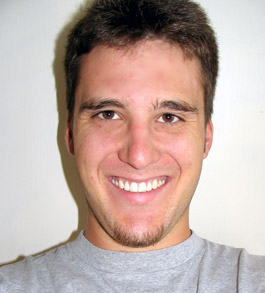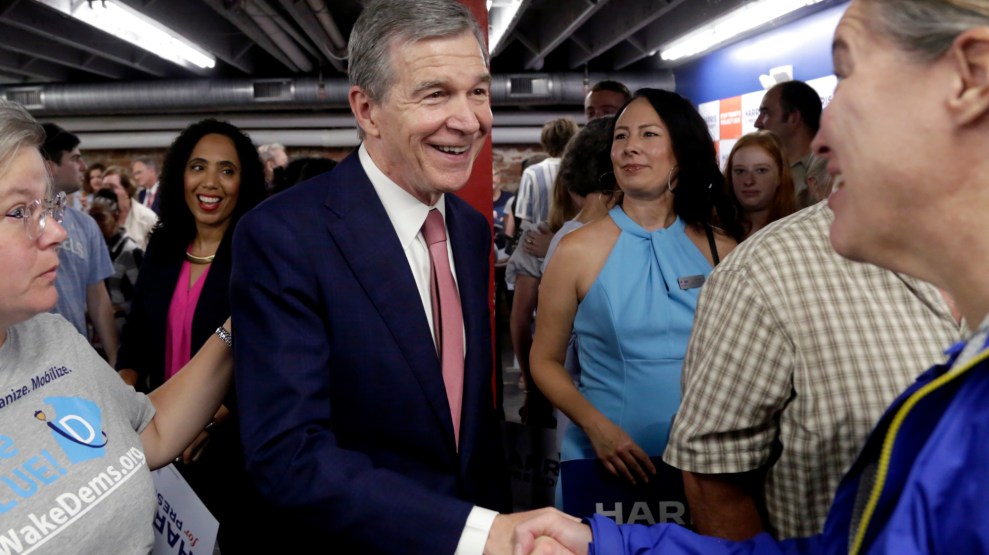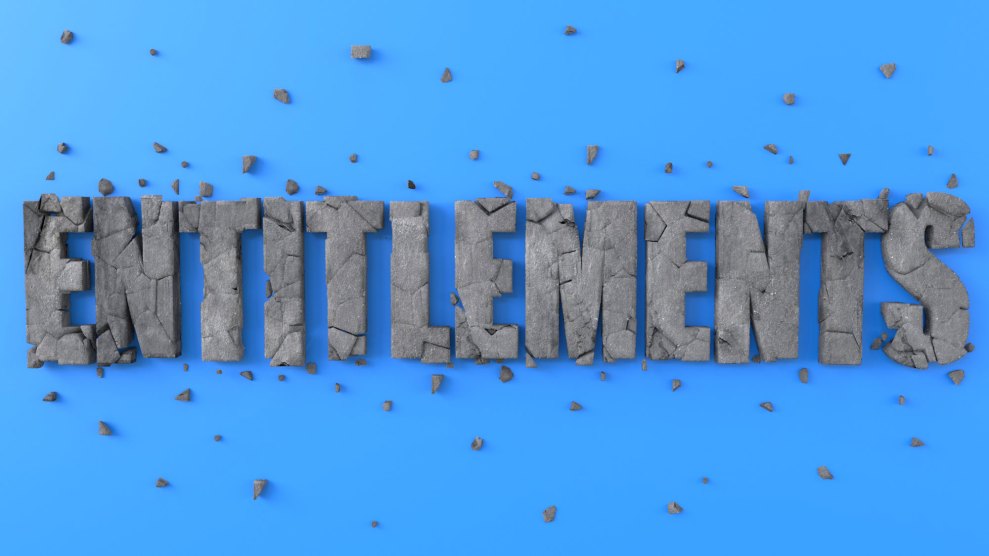
Tens of thousands of people—perhaps hundreds of thousands, according to some estimates—have been killed over the past two and a half years in the genocide ravaging the Darfur region of western Sudan. As Mother Jones senior editor Monika Bauerlein recently advocated, international pressure could readily end the bloodshed and bring aid to the suffering. However, few nations have mustered the resolve to tackle the crisis, particularly the United States, where the Bush administration has condemned the killing but done little to intervene.
Among the few who have stepped up to fill the void is 21-year-old Georgetown senior Nate Wright. A year ago, Wright co-founded Students Taking Action Now: Darfur (STAND) with senior Ben Bixby, the president of the campus’s Jewish Student Association, and with help from the U.S. Holocaust Memorial Museum. Their goal was to raise awareness about the ongoing genocide, raise relief funds for humanitarian aid, and lobby for immediate political action. To their surprise, their plan didn’t just light a spark at Georgetown—it spread like wildfire to other schools, and Wright’s national STAND Coalition now has tens of thousands of students connected across nearly 200 campuses in the United States and Canada.
This grassroots effort is keeping the hope of U.S. and international action to stop the genocide alive, despite the deafening silence in Washington and the major media. “The American news media aren’t even covering the Darfur genocide as well as we covered the Armenian genocide in 1915,” wrote New York Times op-ed columnist Nicholas Kristof in July. “And, incredibly,” continued Kristof, whose passionate dispatches over the past year and a half have routinely reminded readers not to forget about Sudan, “mtvU (the MTV channel aimed at universities) has covered Darfur more seriously than any network or cable station.” When Kristof praised mtvU, he was indirectly commending Wright, who was one of three student correspondents the network sent to record the lives of Darfurian refugees in eastern Chad in March. (Their remarkable photographs and journals can be viewed at mtvU.com.)
Mother Jones recently talked with Wright—whom we named our 2005 Student Activist of the Year—about his experiences in the refugee camps, ways to take action now, and the history of STAND.
MotherJones.com: What is STAND?
Nate Wright: We’re about creating the political noise that says there has to be a better response to the crisis in Sudan; we’re about highlighting where we see a better response; and in doing so, I think that gives a lot of hope to the people in Darfur. Last September, we outlined an approach where we would look at it from three different angles—raising awareness, raising relief funds, and pushing for a political solution. We were extremely, extremely active right at the beginning of the semester. Georgetown STAND was hosting three or four events on campus a week. Almost immediately we gained so much support on our own campus that we began looking at ways in which we could spread the idea of student activism to other campuses. By October, we had other schools that were adopting the STAND format of approaching it in those three different areas.
MJ: What form were those events taking?
NW: For example, I put together a speaker series that would have one to two speakers a week coming to campus to talk about it from a variety of different angles so we could educate ourselves on the nuances of the issues like international law and how international law plays into why can the United States call it genocide and then not act. We’d do other things like have green ribbons for people to wear as a way of raising consciousness. We’d do fund raising events for the humanitarian relief efforts. We’d have hundreds of students from Georgetown writing letters to [then-Secretary of State] Colin Powell and to their representatives, calling for them to take a stand on this issue and articulate exactly what they were going to do. There were a variety of ways we were approaching it, and most of the work that we were doing was replicable on other campuses.
MJ: What were some of your biggest successes?
NW: On November 20, we held one of our first big events, the STANDFast: Essentially the idea was that you’d give up a purchase of a luxury item for the day—dessert, coffee, soda, whatever it might be—and you would donate the money that you would have spent on it to humanitarian relief efforts. At Georgetown, we ended up getting well over a thousand people who all decided to give up alcohol on a Saturday night right before a major break—one of the big party nights and 15 percent of the student body gives up alcohol to show their support for the people in Sudan. We gathered a lot of media attention. For example, MTV came down and covered that, and the Washington Post ran a story on the student movement.
When we held a conference here at Georgetown in conjunction with the Holocaust Memorial Museum in February, we had over 400 students from around 100 different universities across the United States and Canada. That was where we began to form what is now the national STAND Coalition. At the conference we also announced a partnership with mtvU to host a future event, and mtvU announced that they would be sending three college students into the Darfur region to document the stories of the refugees for two weeks in March. Those students were myself, Andrew Karlsruher, a film student at Boston University, and Stephanie Nyombayire, a student at Swarthmore College and a citizen of Rwanda who lost nearly a hundred family members in the Rwandan genocide. The three of us went into a lot of the camps along the border in eastern Chad and spent nearly two weeks interviewing a lot of the people and putting together a documentary that documents the stories of the refugees.
MJ: What was it like producing that documentary? What was it like being there?
NW: You want to be able to go over there and say that when you come back, things are going to change. You want to be able to promise [the refugees] so much more than you can deliver them. It definitely gives you an incredible sense of helplessness when you can’t really bring them anything more than a voice. I mean, they are incredibly grateful just for the opportunity to be heard and to know that they haven’t been forgotten, but there is sort of this sense of helplessness. At the same point in time, there are so many absolutely amazing stories. The first refugee that we met as we were going to these camps in eastern Chad started talking about these students from D.C. who were giving up their privileges to help the people in Darfur. It even took me a minute to realize that he was talking about the project that we had done: When we did that first STANDFast back in November, myself and several other of the students did an interview with Voice of America, and he could have been listening to my voice. It was something that he was incredibly touched by—the fact that students in the United States hadn’t forgotten about them and cared about them and were trying to do something to make their lives better.
And even though everyone would talk about how they didn’t have enough food and water, whenever you walked into anyone’s tent, you would have to ask them not bring you any food or water because they’re just so hospitable. Even though they can tell you’ve got money—we’re wearing clothing that hasn’t been torn apart—to see these people in these conditions offering you food and water, it’s incredibly moving. I don’t think that they can really understand how people in the United States could see this and not do something. It really seemed as if that idea was beyond them, that someone could see their suffering and not want to help them.
MJ: How were the children in these camps dealing with the tragedies they’ve experienced?
NW: If you ask the children anything about what they’ve been through, they’ll freeze up most of the time. They won’t be able to talk about it. At one of the camps that we went to, this little kid came up to me and started shaking my hand. He’s holding this booklet in his hand, and I opened up the booklet and started looking through it, and there were all these pictures of armed men attacking their village, helicopters bombing a village, people getting shot, and a village being burned down—all these horrific pictures being drawn by a school kid who’s smiling just because he wants someone to pay attention to him. You ask what each of these things are and hear, “That’s my aunt,” and it’s a picture of this woman getting shot. Or, “That’s my cousin,” and it’s a picture of a woman getting raped. And when I started looking through his pictures, the next thing I know, there’s a group of 40 children, each of them holding up the same sorts of pictures. I ended up spending two and a half, three hours, just looking at picture after picture after picture of what these kids had drawn. That’s incredibly moving, and it’s so hard to leave them.
MJ: What can an ordinary person do to help this cause?
NW: A lot of people don’t realize how simple it is to really help these people. Fifty cents will feed a refugee for a day. Nineteen cents will give a schoolchild a meal. It’s incredibly amazing how far a dollar will go just in the humanitarian aid effort. It doesn’t take a whole lot to really make a difference for these people. Several Congressmen have done a lot of legislation on this. Both the Darfur Accountability Act and the Darfur Genocide Accountability Act take people from both sides of the spectrum who have never before worked on anything, and yet, on Darfur they agree. But unfortunately there hasn’t been enough pressure to get through. Even something as simple as calling up a representative, talking to them about this, asking them what their stance has been on this, and pointing to legislation is good. If nothing else, just be a voice that says, “I care about the people in Sudan, and I want to see to this changed.” There’s just so many different small things that people can do to really change things. You do what you can with what you’ve been given, and I really think that holds true everywhere.
MJ: How did you win the Darfur Activism Award?
NW: Coming off the second STANDFast with mtvU on April 7—which coincided with the anniversary of the start of the genocide in Rwanda and had 170 universities, 18 universities in Canada, and dozens of high schools participating in it—the next big success was that organizations like Reebok wanted to be involved in the student movement. They decided that they would offer a $40,000 grant to one of the student groups on Darfur who would put together the best proposal. It was narrowed down to three different universities and then opened up to voting on mtvU, and Georgetown won the $40,000 grant. So we’ve got a lot of big plans. We have had tremendous success in raising a lot of awareness, getting a lot of college student involved in it, and now we’re looking toward the future. We’re planning on a larger conference in August, we’re planning a new national solidarity fast, and we’re also looking to create a sponsor and camp program. We have been working with a lot of the humanitarian organizations, so you’d essentially have local areas inside the United States sponsoring specific camps, specifically sponsoring the education in camps in Darfur and eastern Chad.
MJ: How will you set up this sponsor program?
NW: We’re working with both UNICEF, which builds and helps run a lot of the schools, and the World Food Programme, which provides school feeding. You can’t really concentrate in school if you’re extremely hungry. A lot of this is coming off of the trip that I took there, because we spent a lot of time trying to talk to people our age and asking them if they could ask for anything from the college students in America, what it would be. And the overwhelming response was, “We want to be able to educate ourselves,” largely because they see that as the ultimate remedy to be make sure something like this never happens again in the future of Sudan.
MJ: What do you see as a real, sustainable solution to the crisis in Darfur?
NW: I personally think that if we, the international community, had responded earlier to the crisis, there would have been so many more options. Where we are now, I think the solution to the crisis looks like getting the Sanctions Committee for the United Nations to actually implement the sanctions, so I think there has to be pressure on the Sanctions Committee to do that. No one thinks that Khartoum will allow anyone into Darfur other than the African Union, so I think at this point in time we need to focus on being able to strengthen the African Union, which has about 3,000 troops in there now. It’s an area roughly the size of Texas, though. When the troops are actually able to get to a camp [of internally displaced people inside Sudan] before it is attacked, they’ve been incredibly successful at being able to avert attacks. But the numbers are too small and so ineffective because they don’t have logistical support most of the time. The African Union uses the cars from humanitarian aid workers. There needs to be a lot done by the international community, by organizations like NATO, to support the AU troops.
I also think that efforts need to be made to pressure the United Nations to send in a peacekeeping force designed to gather evidence of human rights violations to be able to prosecute the perpetrators through the International Criminal Court and through other courts. I think there needs to be a lot of work done to gain the evidence necessary to prosecute them. The Rwandan courts have incredible difficulty prosecuting people because so much evidence was lost. I think if we learn anything from that, it should be that we should make a concerted effort in any sort of peacekeeping movement to gain evidence of those human rights violations.
MJ: What do you make of the tremendous successes that STAND has achieved?
NW: When we were sitting in an auditorium listening to the speech and presentation of the Holocaust Museum, none of us expected that we’d be sitting here working on coordinating a coalition that had tens of thousands of students. We are students who believe in the sanctity of human life; we believed that there had to be a better answer for genocide; and we’re just taking whatever steps we can see. We’ve done a lot to help educate ourselves in finding what the best steps to take are, but the important thing is to do what you can with what you’ve been given.
















